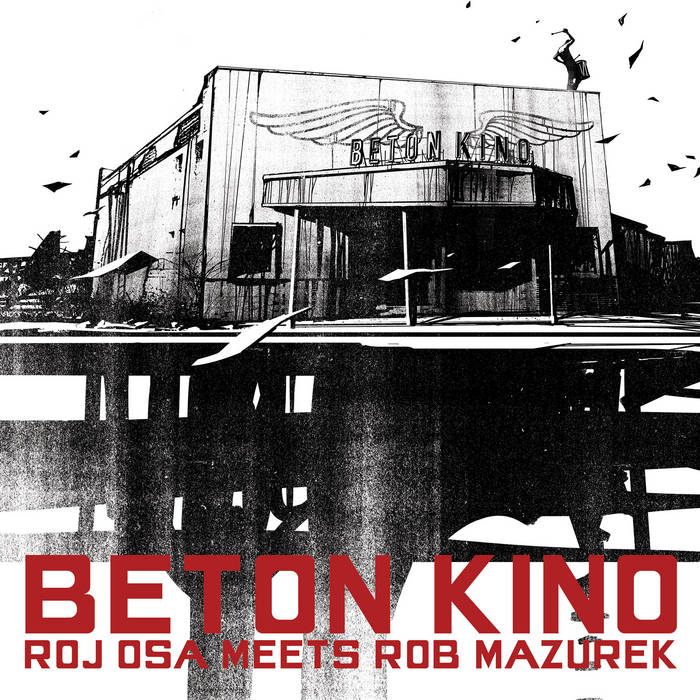Before even pressing play on Beton Kino, Danijel Žeželj’s cover draws you into the record’s crumbling post-industrial setting. The popping blood-red colour, angular lines of the title’s font and slabs of black-and-white concrete are so vivid you can almost hear them: grimy guitar riffs, arrhythmic percussion, oblique electronics and expansive trumpet yelps reverberating in abandoned brutalist architectures.
For the past two decades, Roj Osa’s bassist Alen and guitarist Nenad Sinkauz have been among the hardest-working musicians in the small yet solid Croatian outré music scene. Originally active through the noisy post-rock group East Rodeo in the 2000s, the brothers have since scored films, helmed speculatively futuristic audiovisual groups (Day Of The Year), contributed to multimedia projects and installations and launched their own experimental/improvised music festival (AudioArt in Pula). Yet, the Sinkauz brothers’ work stubbornly eluded documentation, as if it were meant to be experienced only in the moment.
In 2022, following the launch of their own label, Kopaton Records, and the formation of the trio Roj Osa with drummer Marco Quarantotto, the ephemera of their continued praxis finally started taking a more solid shape. Roj Osa’s 2023 debut, Azbestni Krovovi (‘Asbestos Roofs’), focused the brothers’ appreciation for voluminous compositions into a more claustrophobic industrial space.
Beton Kino emerges amidst similar socrealist bleakness and disassembled rock, but Rob Mazurek’s predilection for interstellar sonics and psychedelia soon makes them all venture outward.
Unlike many post-internet age collaborations, the US trumpeter and Roj Osa worked together in the flesh in November 2024, recording across multiple concerts and a four-day residency at Split Youth Center’s venue Beton Kino, from which the album gets its name. That the music was conceived live is evident right from the first sequences of ‘Rustroot’, as electronics and trumpet bursts start to circle and flicker like fireflies against a factory hall’s oily black canvas. Even in lowercase cuts like this one, there is spontaneous creation and camaraderie that can only be born from collective interactions.
Compared to the muted, cautious opener, ‘Stone Sage’ sees the group kick into higher gear. Mazurek gives his lungs a proper stretch with elongated and ever more forceful brass licks that help Roj Osa expand their sparse industrial ambient into a dizzying sense of vastness. Over the next three pieces, ‘Dandelion’, ‘Asphalt Henbane’ and ‘Chickweed Crossroads’, they grow a lush forest in the ruins of a post-apocalyptic city, allowing verdant colours to seep through the cracks in oppressive concrete. The march of kick drums is supplanted by the light dance of cymbals. Synths and guitars straighten their jagged riffs into flowing melodies. And Mazurek roams around like a songbird flying through a jungle, alternating gorgeous, stretching trumpet and cornet phrases with wild vocalisations and chime textures. It all ends up in the sort of American primitive ambience that wouldn’t feel out of place on Bob Holmes’s Across The Horizon project.
Like on his other 2025 releases – the solo album Nestor’s Nest, the collaboration with Italian musician Alberto Novello Sun Eaters, and the latest Chicago Underground Duo – Mazurek’s playing is abstract and exploratory here, interlaced with Roj Osa’s elusive figures in a way that’s reminiscent of vocalist Isabelle Duthoit’s flow on her stunning recent collab with the Sinkauz brothers, Circuit Breath. Then, a sudden change in energy.
Recorded at the Vintage Industrial Bar in Zagreb, the triptych ‘Nettle’/’Smokestack Ivy’/’Where Is Gogi’ turns Roj Osa and Rob Mazurek into a raucous jazz-rock outfit. The Sinkauz brothers and Quarantotto lay down straighter, swinging and grooving patterns. Meanwhile, Mazurek reaches for his Exploding Star Orchestra repertoire of cosmic licks to try and follow them, inserting himself forcefully into their tight rhythms. Like the venue – whose decor screams hard rock with its wood-decked bars and sleazy vibe – these cuts are hard-driving and restless, post-rock crescendos gone scorched earth.
This plateau of intensity would have been a good place to end the album – a rowdy party in the ashes of the old world – but the group fall back into the mellow nocturnal figures and Nadja-esque guitar fuzz of closer ‘Bleeding Concrete’, which seems both oddly out of place and just the drop of comfort you need after a wild ride like Beton Kino.


